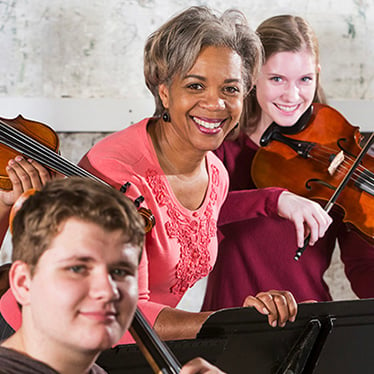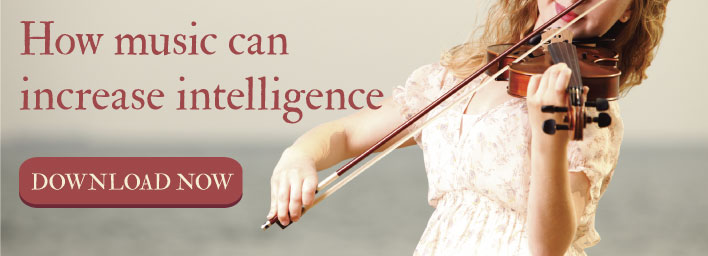Teacher’s Corner: How to Guide Your Gifted Students to the Best Music Schools

Nurturing and supporting talented music students through high school, and then facilitating their launch to the best music school is one of the most rewarding aspects of being a music teacher. Deciding on which type of school to attend, and then which program is best for the individual student, can feel overwhelming to students and their parents.
Your support and wisdom play an essential role in streamlining the process, making it a natural unfolding of their path. Here are some the ways you can guide your gifted students to the best music schools.
Define what “best music school” means for the student in question
There are many ways to define “the best music schools.” Obviously, conservatories such as Julliard or the Berklee College of Music are recognized worldwide, but that doesn’t make them the best schools for all students – no matter how gifted they may be. Take time to get to know what your students are interested in from a whole-education, whole-environment, and whole-person perspective.
For example:
- Do they thrive on competition, or are they more fragile and desiring a school where they can grow their passion in a more nurturing environment?
- Do they want to attend a small school or a large school?
- Is music their 100% focus, or are they interested in other areas of study as well?
- Are they interested in moving far away from home? Or would a smaller geographic radius ease any potential anxiety they may have about their first foray into the adult world?
It’s easy to assume that the most gifted students want to attend one of the Top 10 schools and to push them in that direction. However, it’s most important that students feel safe, comfortable, and at home in their new school – and that might mean their top picks vary from yours.
Define the various types of music schools for them
The term “music school” is ambiguous because there is a wide range of schools that fit that definition. Make sure students clearly understand the three, general options:
- Conservatory. Here, students study music, music and more music – and that’s about it. Examples of these would be the aforementioned Julliard School and Berklee College of Music, as well as The Curtis Institute of Music, The New England Conservatory, or the Cleveland Institute of Music. If your student is a gifted cellist but is also interested in pursuing marine biology, a conservatory is not the way to go, regardless of his/her talent.
- Liberal Arts School. Liberal Arts colleges have smaller populations, typically 5,000 students or less, and are ideal for students who don’t feel comfortable in larger university or college settings. Shier, less competitive students – as well as those interested in multiple areas of study – are more suited for liberal arts schools with solid music programs such as Wesleyan, St. Olaf College, The Conservatory of Music at Shenandoah University, and Oberlin College’s Conservatory of Music. Liberal arts college conservatories offer the best of both worlds.
- Colleges or universities. Then there are the colleges and universities with enrollments of 8000 to 10,000 students or more. Examples of universities with well-known music programs include both USC and UCLA, the University of North Texas, and Yale School of Music.
It’s just as much in a universities’ best interests to have satisfied students as it is in the students’ best interest, so getting students into the school where they're most comfortable is Step One. Reassure eager parents that if their child is meant to attend a conservatory, there is always grad school, and they’ll be better prepared and more well-adjusted by that point.
Have information about great music programs readily available
Students make the best choices when they’ve had a chance to marinate in the idea for the years preceding application deadlines. This allows them to mull things over and to visit top schools of interest each year.
Feel free to direct them to some of our blogs on the topic, including:
- Best Music Schools in the Western US
- Best Music Schools in the US Northeast
- Best Music Schools in the US South
- Best Music Schools in the US Southeast
Encourage students to attend university-hosted summer music camps
Summer music programs and camps are commonly hosted on music school campuses for this very reason – schools learn more about students prospects, while students have a chance to see if they feel at home in the school’s environment and culture. Attending a prestigious music camp is to the budding musician what a prestigious sports camp is to an athlete hoping to be scouted.
Help students compile digital audition materials, a portfolio, and a solid application and resume
For many students, this is the first time they’ve had to apply and audition for such an important position, and that feels daunting. Provide the support they need to create high-quality audition materials, a well-written, proofread essay, and so on. If their audition will be live, set up a few practice auditions with other adult music experts who are willing to volunteer for the cause. And, of course, do your best to write highly-personalized, honest, and authentic letters of recommendation that highlight the student’s unique gifts, talents, or abilities to help them stand out among the pack.
The time and energy you spend to guide your gifted students to the best music schools for their needs is one of the best gifts you can give as they launch into the world of independent adulthood and musicianship.


